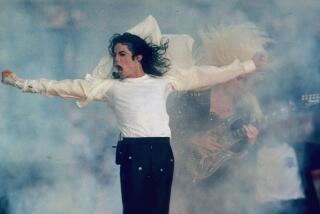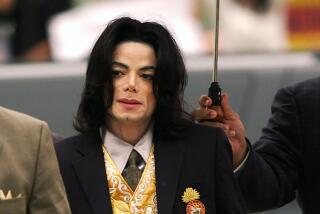2 AEG executives dismissed from Jackson suit
A Los Angeles County Superior Court judge dismissed the case against two ranking executives in the Michael Jackson wrongful death suit Monday but ruled that there was enough evidence to let jurors decide the lawsuit against their employer, concert promoter and producer AEG Live.
When the months-long case finally goes to the jury, the stakes could be enormous. Attorneys for Jackson’s mother and three children presented testimony that Jackson could have earned as much as $1.5 billion had he not died on the eve of his “This Is It” comeback tour.
The Jacksons’ lawsuit charged that AEG Live, chief executive Randy Phillips and executive Paul Gongaware negligently hired and supervised Dr. Conrad Murray, the Las Vegas physician who administered a fatal dose of the anesthetic propofol to the singer to help him fight insomnia.
AEG, though, has argued that it was Jackson who hired Murray and that any money the company was supposed to pay the doctor was part of an advance to the singer.
Murray was convicted of involuntary manslaughter in Jackson’s June 2009 death and is serving jail time.
Brian Panish, the lead attorney for Jackson’s family, said Judge Yvette Palazuelos’ ruling didn’t change the heart of the case.
“We’re where we were at the beginning of the case.” he said. “Everything they’ve done to stop the jury from deciding the case has failed.”
Jody Armour, a professor at USC’s Gould School of Law, agreed, because the entertainment giant — which also owns sports teams, arenas and stadiums around the world — has the resources to satisfy nearly any judgment. The company also was contractually bound to pay any judgments against Phillips and Gongaware, who have been among the most important witnesses.
“AEG has been the great white whale all along,” Armour said. “If you still have AEG in the suit, then you’re feeling pretty good as a plaintiff.”
Marvin Putnam, lead attorney for the defendants, issued a statement calling the judge’s ruling “a huge victory” for Phillips and Gongaware.
“The Jacksons have besmirched their reputations and dragged their good names through the mud without any basis whatsoever,” he said.
In her ruling, the judge wrote that she dismissed the case against Phillips and Gongaware because the evidence showed their dealings with Murray were on behalf of AEG Live. She said “Phillips and Gongaware did not control, direct, or perpetrate any of the activities in [Jackson’s] home,” where Murray was giving him propofol and the singer was preparing for an ambitious set of concerts in London.
However, she ruled that the Jacksons had presented ample evidence for the jury to decide if AEG was liable.
“Substantial evidence has been presented at trial from which a jury can reasonably infer that defendants knew or should have known that Dr. Murray presented an undue risk of harm” to Jackson, Palazuelos wrote.
The Jacksons called Phillips and Gongaware as witnesses early in the trial, and their credibility came under fire during withering questioning by Panish.
Phillips wrote several emails that have emerged as key evidence.
He received an email a few days before the singer died from Kenny Ortega, the director of the planned 50 concerts in London, saying that Jackson was showing “strong signs of paranoia, anxiety and obsessive-like behavior” and needed psychiatric help.
Phillips replied: “I had a lengthy conversation with Dr. Murray, who I am gaining immense respect for as I get to deal with him more.... This doctor is extremely successful (we check everyone out) and does not need this gig so he [is] totally unbiased and ethical.”
But testimony showed that the company did little to investigate Murray. The doctor, who took the unusual step of closing his practice to serve as Jackson’s tour physician, was deep in debt and facing foreclosure on his home.
Jurors were also shown a TV interview in which Phillips said “so we hired him,” referring to Murray.
Gongaware wrote an email that could be among the most important pieces of evidence in determining who employed Murray.
Eleven days before the singer died, he wrote: “We want to remind him [Murray] that it is AEG, not MJ who is paying his salary. We want him to understand what is expected of him.”
Gongaware, who knew Jackson from previous tours, helped negotiate Murray’s contract, which was supposed to pay him $150,000 a month. No one connected with Jackson was shown any of the contract’s three drafts.
Murray signed the contract the day before Jackson died, the only one who signed the document.
More to Read
Sign up for Essential California
The most important California stories and recommendations in your inbox every morning.
You may occasionally receive promotional content from the Los Angeles Times.











